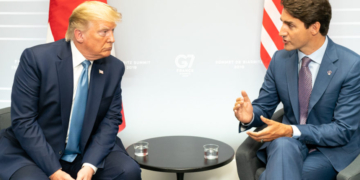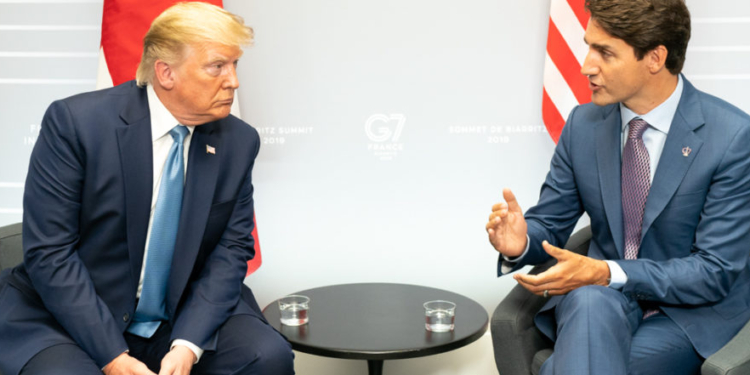Canadian Prime Minister Justin Trudeau prepares to step down as Liberal Party leader after nearly a decade of implementing radical progressive policies his critics say were “destructive” to the nation.
Trudeau announced that he would resign as PM and party leader after his party chooses a replacement, citing internal battles as a main reason for his departure. The nine-year PM suffers from record unpopularity, and has been reeling from his Finance Minister Chrystia Freeland’s resignation, which was prompted in part by Trudeau’s spat with Trump over tariff policy.
“Every Liberal MP and Leadership contender supported EVERYTHING Trudeau did for 9 years, and now they want to trick voters by swapping in another Liberal face to keep ripping off Canadians for another 4 years, just like Justin,” Conservative party leader Pierre Poilievre said on X regarding Trudeau’s resignation.
“Every single one of these Liberals supported Trudeau for 9 years. Not a single one stopped his destructive policies. They’re not the solution—they are JUST LIKE JUSTIN,” Poilievre said on X.
Trudeau’s popularity took a dive after his questionable handling of the COVID-19 pandemic events surrounding its restrictions.
COVID-19 and Trucker’s protest
In Feb. 2022, Trudeau cracked down on truckers protesting COVID-19 vaccine mandates and passports by blocking Ambassador Bridge at the U.S.-Canada border, dubbed the “freedom convoy.” Ontario Premier Doug Ford declared a state of emergency to reign in the protestors with threats of arrests and fines, while Trudeau froze truckers’ bank accounts under the Emergencies Act.
Truckers couldn’t use credit cards either while the act prevented fundraiser money from reaching the truckers, while businesses were barred from dealing with people associated with the protests, according to CBC.
The Liberal Party’s popularity plummeted to a new 12-month low as a result, and 47% of Canadians had a worse impression of Trudeau in light of how he handled the trucker’s protest, according to a Nanos poll taken in February.
A federal court later declared that Trudeau violated the constitution by using the Emergencies act.
“I conclude there was no national emergency justifying the invocation of the Emergencies Act and the decision to do so was therefore unreasonable,” Federal Court Justice Richard Mosley wrote in his decision. “The decision to issue the Proclamation does not bear the hallmarks of reasonableness – justification, transparency and intelligibility – and was not justified in relation to the relevant factual and legal constraints that were required to be taken into consideration.”
Climate Policy
Trudeau’s spearheaded many green energy projects that were disconnected from “economic realities,” according to Senior Vice President of Policy at the Business Council of Canada Robert Asselin.
In 2018, he instituted a carbon tax that saddled each Canadian household with $1,157 of burden by 2030, according to EnergyNow. Critics have noted the policy’s high economic cost, with the policy estimated to cause a 1.8% shrinkage in the GDP of Canada, according to the Fraser Institute.
“The only way to fix what Liberals broke is a carbon tax election to elect common sense Conservatives who will bring home Canada’s promise,” Poilievre said on X.
Trudeau also introduced a plan in 2022 to reduce nitrogen emissions from fertilizer use by 30% from 2020 levels by 2030, the same policy that sparked massive upheavals in Europe from farmers. When Sri Lanka banned the use of chemical fertilizer, their crop yields were cut in half.
Critics previously told the Daily Caller News Foundation that Trudeau’s push for the policy only weeks after Sri Lanka’s economic collapse was shocking. Saskatchewan Minister of Agriculture David Marit was also concerned with Trudeau’s “arbitrary” goal.
Cost of Living
Under Trudeau, the cost of living crisis in Canada has only worsened, with homes and basic necessities ballooning in cost.
The median home price in Canada increased by a staggering 227% from 2003 to 2023 while annual earnings only increased by 74.3%, according to an analysis by NerdWallet. The share of households struggling to make ends meet in Canada rose from 21.9% in 2018 to 30.9% in 2022, according to a survey by Statistics Canada released in September.
Since Trudeau took power in 2015 until 2023, the consumer price index in Canada has risen by 30%, according to Statistics Canada. Moreover, grocery prices in Canada are projected to rise by an additional 3-5% in 2025, according to a Dalhousie University report.
Among Canadian voters top concerns are living costs, housing affordability, health care, the economy and immigration, according to an Abacus Data poll taken June 20 to June 25.
Free Speech and Censorship
Trudeau also worked hard to bring censorship and hate speech laws to Canada.
Trudeau backed bill C-16 in 2016, which would have added gender identity as a protected class against “discrimination,” according to the bill. Clinical psychologist and public intellectual Jordan Peterson famously came out against the bill, with him and many other critics saying the law would compel Canadians to use preferred pronouns.
“I don’t recognize another person’s right to determine what pronouns I use to address them. I won’t do it,” Peterson said at the time. “The pronoun issue is straightforward. I won’t mouth the words of ideologues, because when you do that you become a puppet for their ideology”
Trudeau also backed a bill introduced in March 2024 that would make it a crime to spread content online that “foments hatred” or “incites violence” or “violent extremism or terrorism,” according to a summary of the bill. Poilievre, Trudeau’s main opposition, said the law was an infringement on “freedom of expression” and that the government shouldn’t define what hate speech online is, according to CBC Feb. 2024.
Immigration
Trudeau has also kept the borders wide open to immigration during his tenure.
Since the Liberal Party came to power in 2015, it has championed increasing immigration to the nation, according to its platform from Trudeau’s first year as PM. From 2016 to 2021, Canada has welcomed 820,675 immigrants, mostly of Indian origin, according to Statistics Canada.
Most of the immigrants come for economic reasons, with the second most common reason being sponsorship by family already in Canada, according to Statistics Canada. From 2017 to 2018, Canada spent nearly $270 million of taxpayer dollars on illegal immigrants.
Trudeau’s office did not immediately respond to the DCNF’s request for comment.
All content created by the Daily Caller News Foundation, an independent and nonpartisan newswire service, is available without charge to any legitimate news publisher that can provide a large audience. All republished articles must include our logo, our reporter’s byline and their DCNF affiliation. For any questions about our guidelines or partnering with us, please contact [email protected].



























 Continue with Google
Continue with Google